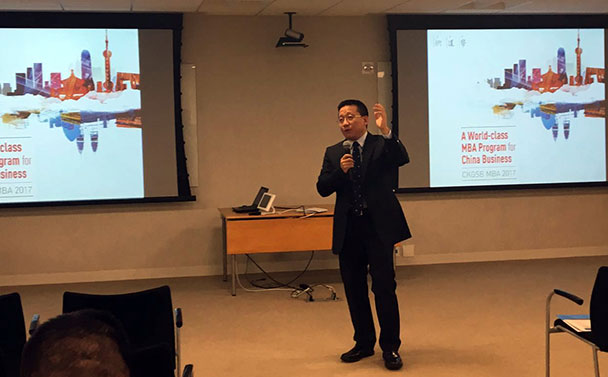CKGSB Americas hosted Li Haitao, Professor of Finance and Associate Dean for CKGSB’s MBA program, for a lecture on Wednesday, October 5.
Professor Li spoke to prospective students and other members of the CKGSB community about the unique opportunities the school has to offer aspiring business leaders who want to take advantage of the rapidly-growing Chinese economy. He also gave his views on where China is headed at this pivotal moment in its history.
“We face challenges right now in China,” Professor LI said. “But I think China has great potential. It is the greatest driver of global growth, and the best days are yet to come.”

Despite his optimism, Professor Li (pictured above) did not sugar-coat the struggles the Chinese have faced over the past two years. He pointed to the whipsawing of the Chinese equity market—it rose from just over 2,000 points to more than 5,000 points in the summer of 2015 before tumbling 40% to the 3,000-point level, where it remains today. “A lot of people lost a lot of money,” Li said.
Another challenge has been the volatility in Chinese currency markets as government officials have sought ways for the yuan to float more freely relative to other global currencies. But traders have adjusted slowly to this new stance, which has resulted in destabilizing pressures that cause headaches for those seeking to do business in China.
Finally, Li described the sharp slowdown in growth that the Chinese economy has suffered, as it has realized all the gains it can from its strategy of investment and export-led growth. “The problem we are facing right now is a growth model that is broken, but people are not willing to change gear, because of inertia and political convenience,” said Li. “You want to push the old model as far as you can.” But pushing that model, unfortunately, has led to an unsustainable growth in debt as local governments prop up the economy by issuing debt to state-owned enterprises and finance inefficient infrastructure projects.
There is a light at the end of the tunnel, however. Li argued that a growing Chinese middle class has begun to demand high-quality services that will become the basis of China’s new economy. Li pointed out that in 2016 the Chinese service sector as a percentage of GDP surpassed the size of the industrial sector: “China is at the stage where the traditional economy’s slowing down, but the service sector—the new economy—is becoming more and more important,” said Li.
The force that will support this new economy is a rising Chinese middle class, as evidenced by the the building Chinese demand for educational services, luxury goods, entertainment options like movies and tech products, and tourism. While these industries won’t provide the same double-digit growth rates China became used to over the past twenty years, they will be the source of the next generation of business opportunities in China. Li pointed to previous examples of economic development like the United States, Korea, and Japan to show that as middle-income countries continue to develop, they transform from manufacturing economies to service-based ones.
What is needed to cement this this transition are government reforms that will reduce inefficiency and unlock the inherent ingenuity and diligence of the Chinese people. He pointed out that private Chinese companies are doing quite well when compared to state-owned enterprises, which are being kept alive by cheap lending funneled to them by the government, which relies on them to provide widespread employment.
“My confidence in the Chinese economy is based on my observations of Chinese people,” Li said. He argued that the Chinese are “very driven, willing to work hard to have a better life, and they all want to be rich.” It’s these qualities that have the potential to spark necessary reforms and transform China into a hub of creativity and innovation.
Of course, the Chinese government must implement policy—like downsizing the state sector, liberalizing financial markets, and allowing more cross-border investment—to make this happen. But Li is confident in the government’s capacity to enact these reforms for the simple reason that if it doesn’t, the consequences for the Chinese Communist Party will be dire.
It is all these trends that convinced Professor Li to return to China after spending decades studying and working in the United States. “I am very optimistic about China. That’s why I quit my job as a tenured professor at Michigan,” he said. “I am talking the talk and walking the walk.”
But not everyone will be able to succeed in the fiercely competitive Chinese market without some help. Professor Li argued that there are few means of developing the tools necessary for success better than a degree from CKGSB. While world-famous American business schools are great places to train to succeed in the United States and Europe, they simply don’t have the granular understanding of the Chinese culture and business landscapes that CKGSB professors can impart.
To testify to the career-accelerating education that CKGSB provides, Professor Li was followed by an alumnus and current student of the program, who described how the immersive cultural experience of an MBA degree from CKGSB helped them understand how to do business in China, and how the exacting academic standards gave them the knowledge to take on any career challenge. As Professor Li put it, “Spiritually, CKGSB is rooted in China.”